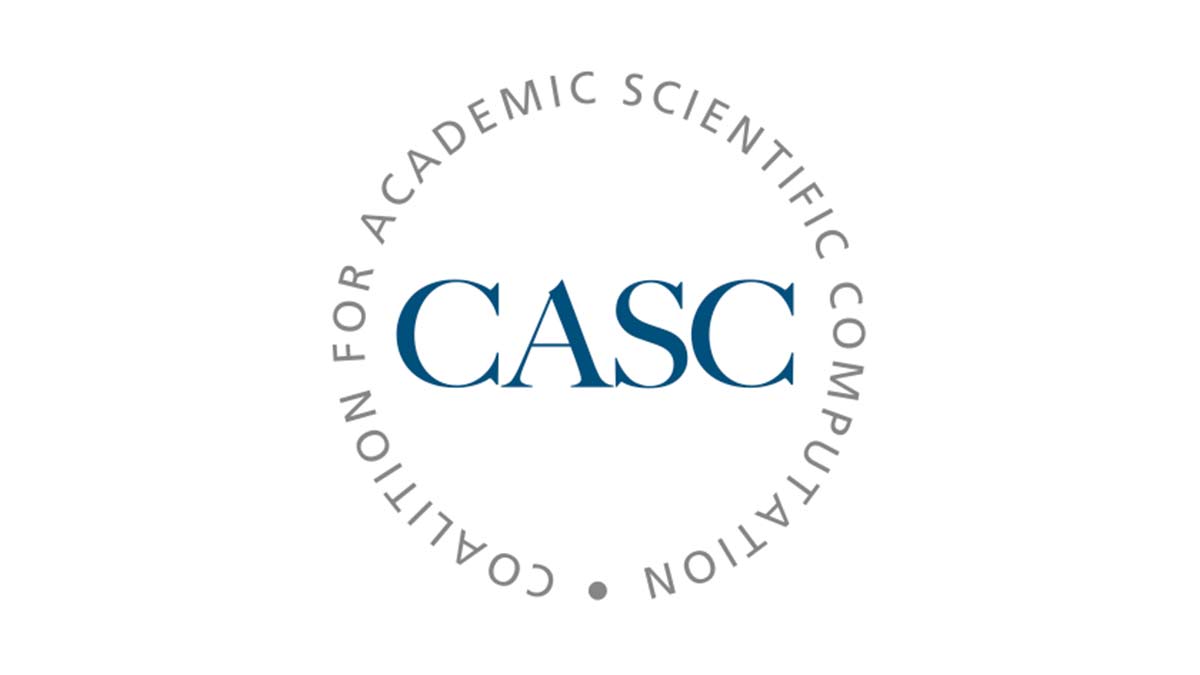
Figurelle appointed chair of Coalition for Academic Scientific Computation
Posted on March 1, 2021University Park, PA — Wayne Figurelle, assistant director of Penn State’s Institute for Computational and Data Sciences (ICDS), has been elected executive committee chair of the Coalition for Academic Scientific Computation (CASC). Figurelle’s two-year appointment began on January 1, 2021.
Founded in 1989, CASC is a network of more than 90 U.S. institutions that provide research computing services and support, representing many of the nation’s most forward thinking universities and computing centers. CASC is dedicated to advocating the use of the most advanced computing technology to accelerate scientific discovery for national competitiveness, global security, and economic success, as well as develop a diverse and well-prepared 21st century workforce.
“It’s an honor to have the opportunity to lead such a diverse group of institutions that are focused on delivering high-quality research computing services across the U.S.,” Figurelle said. “I’m looking forward to working collaboratively with the executive committee, as well as the broader CASC community, to ensure that CASC continues to be an organization that supports and advances our members collectively.”
Figurelle first became involved in CASC when he joined ICDS as assistant director in 2013.
“I went to my first meeting and knew immediately that I should be engaged with this group,” he said. “I was able to make connections with leaders at other universities and institutions, which was incredibly valuable.”
He joined CASC’s programs committee in 2016, and in 2018 was appointed as chair for the CASC by-laws committee. Under his leadership, CASC overhauled its by-laws, which set the stage for the organization to be more nimble when creating and delivering position statements to funding agencies, private foundations and other organizations seeking input from the research community.
In the next two years, Figurelle said he intends to lead CASC in executing its first-ever strategic plan, which will further accelerate the organization’s pursuit of its mission.
At ICDS, Figurelle was instrumental in launching several initiatives, including a seed grant program and a faculty coordinating committee. He also helped to overhaul ICDS’s organizational structure and to add a team of computational scientists, known as RISE, who collaborate with Penn State researchers. He is a co-principal investigator on the Cyberteam to Advance Research and Education in Eastern Regional Schools (CAREERS), an NSF-funded initiative to provide computational support to researchers at small- to mid-sized institutions in the northeast U.S. Prior to joining ICDS, Figurelle was the director of industrial innovation programs for Penn State’s College of Engineering. He also held past roles as director of the Pennsylvania Technical Assistance Program (PennTAP), manager at Link Computer Corporation, and senior engineer at Raytheon Systems Company.
Share
Related Posts
- Professor receives NSF grant to model cell disorder in heart
- Featured Researcher: Nick Tusay
- Multi-institutional team to use AI to evaluate social, behavioral science claims
- NSF invests in cyberinfrastructure institute to harness cosmic data
- Center for Immersive Experiences set to debut, serving researchers and students
- Distant Suns, Distant Worlds
- CyberScience Seminar: Researcher to discuss how AI can help people avoid adverse drug interactions
- AI could offer warnings about serious side effects of drug-drug interactions
- Taking RTKI drugs during radiotherapy may not aid survival, worsens side effects
- Cost-effective cloud research computing options now available for researchers
- Costs of natural disasters are increasing at the high end
- Model helps choose wind farm locations, predicts output
- Virus may jump species through ‘rock-and-roll’ motion with receptors
- Researchers seek to revolutionize catalyst design with machine learning
- Resilient Resumes team places third in Nittany AI Challenge
- ‘AI in Action’: Machine learning may help scientists explore deep sleep
- Clickbait Secrets Exposed! Humans and AI team up to improve clickbait detection
- Focusing computational power for more accurate, efficient weather forecasts
- How many Earth-like planets are around sun-like stars?
- SMH! Brains trained on e-devices may struggle to understand scientific info
- Whole genome sequencing may help officials get a handle on disease outbreaks
- New tool could reduce security analysts’ workloads by automating data triage
- Careful analysis of volcano’s plumbing system may give tips on pending eruptions
- Reducing farm greenhouse gas emissions may plant the seed for a cooler planet
- Using artificial intelligence to detect discrimination
- Four ways scholars say we can cut the chances of nasty satellite data surprises
- Game theory shows why stigmatization may not make sense in modern society
- Older adults can serve communities as engines of everyday innovation
- Pig-Pen effect: Mixing skin oil and ozone can produce a personal pollution cloud
- Researchers find genes that could help create more resilient chickens
- Despite dire predictions, levels of social support remain steady in the U.S.
- For many, friends and family, not doctors, serve as a gateway to opioid misuse
- New algorithm may help people store more pictures, share videos faster
- Head named for Ken and Mary Alice Lindquist Department of Nuclear Engineering
- Scientific evidence boosts action for activists, decreases action for scientists
- People explore options, then selectively represent good options to make difficult decisions
- Map reveals that lynching extended far beyond the deep South
- Gravitational forces in protoplanetary disks push super-Earths close to stars
- Supercomputer cluster donation helps turn high school class into climate science research lab
- Believing machines can out-do people may fuel acceptance of self-driving cars
- People more likely to trust machines than humans with their private info
- IBM donates system to Penn State to advance AI research
- ICS Seed Grants to power projects that use AI, machine learning for common good
- Penn State Berks team advances to MVP Phase of Nittany AI Challenge
- Creepy computers or people partners? Working to make AI that enhances humanity
- Sky is clearing for using AI to probe weather variability
- ‘AI will see you now’: Panel to discuss the AI revolution in health and medicine
- Privacy law scholars must address potential for nasty satellite data surprises
- Researchers take aim at hackers trying to attack high-value AI models
- Girls, economically disadvantaged less likely to get parental urging to study computers
- Seed grants awarded to projects using Twitter data
- Researchers find features that shape mechanical force during protein synthesis
- A peek at living room decor suggests how decorations vary around the world
- Interactive websites may cause antismoking messages to backfire
- Changing how government assesses risk may ease fallout from extreme financial events
- Penn State’s Leadership in AI Research
- Symposium at U.S. Capitol seeks solutions to election security
- Using social media to solve social problems- study funded by ICS seed grant

